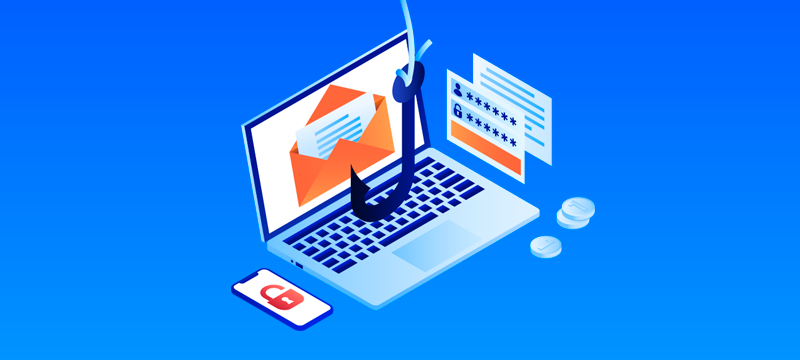Every single year several cyberattacks take place in enterprises in one form or the other. It’s not only just cyberattacks that are on the rise, but even online threats are also looming significantly. Today, email is the primary channel of communication that takes place within and outside an enterprise.
Due to increased risks, email security continues to be the top priority for enterprises. Threats related to email security don’t have a fixed source and thus, it is inevitably vital for enterprises to secure them.
To have enhanced email security, enterprises must adopt email security from a trusted solution provider. Before we head to the various email security threats, let’s see in brief the consequences of a breached email security.
Consequences of Breached Email Security
An email security breach can have devastating effects on enterprises. It results in downtime and disruption in business operations due to the loss of crucial information and, more importantly, damage to the business’s reputation. A cybersecurity report in 2018 stated that about 58% of companies have over 100k files open to everyone, and 41% of enterprises have nearly 1k sensitive files that are open to everyone.
Common Email Security Threats
Now that we have seen the consequences, we shall be discussing the various email security threats that a large enterprise faces. These include-
- Phishing An email phishing depicts a security attack caused by cybercriminals who’re looking to steal critical business information. Any essential business information comprises of usernames and passwords of the top management, details regarding financial accounts, or even any crucial information that can be shared with the enterprise’s competitors. Phishing emails are often masked by enterprise brand indicators like a logo. These phishing emails are often targeted towards the most vulnerable accounts and these mails have links to websites that distribute malware to the enterprise systems.
- Spear Phishing The spear-phishing attack is slightly different from the phishing attack. In spear-phishing, email attack is more adaptable and targeted towards a specific individual or enterprise. For performing spear-phishing attacks, the cyber attacker carries out detailed research about his targets and makes their emails look more authentic and genuine.
- Email Spoofing Spoofing is an email threat designed to gain access to the victim’s personal information. Spoofing is malpractice where the communication is originated from an unknown source that is represented as a legit source to the receiver. Spoofing is delivered to the victims by various channels like- email, and websites in the form of malicious links and attachments.
- Directory Harvest Attacks A directory harvest attack or DHA refers to an email threat that is carried out by cyber attackers with the intent of gaining access to an email database that is a part of the company’s domain. However, in a DHA attack, a simple methodology is followed by targeting both- personal as well as business information. This results in massive damage to a large enterprise. Enterprises can secure their email accounts from any DHA attacks by deploying a Mail Protection Service.
- Whaling Whaling is a form of phishing attack where the top officials of any enterprise are targeted by cyber attackers. It is a type of social engineering attacker where the attacker sends out a threat in emails to someone in the enterprise, who holds the authority to carry out a financial transaction. The fraud email seems authentic as if it has been sent by the enterprise head, requesting some vital information from employees.
How to Stop Threats?
After seeing the most common threats that can arise in an email, in this section, we shall be discussing some ways in which these threats can be stopped.
The threats can be stopped by deploying the following methods-
- Using an Antivirus Having an antivirus might sound obvious today, but still, it is essential to discuss its importance, especially for large enterprises, that hold a large volume of crucial data assets. An antivirus can significantly reduce the threat to email security. Not only antivirus, but enterprises must also look to invest in other security products as well.
- Implementing a Secure Email Gateway An email security gateway is designed mainly for preventing those emails that violate an enterprise’s security policy. By having a secure email gateway within their organization, businesses can monitor and filter email traffic and also mark emails as having malicious attachments. A secure email gateway works perfectly when it is coupled with an automated email encryption tool. An email encryption email tool encrypts sensitive and confidential information in an outgoing email.
- Using Strong Passwords & Multi-Factor Authentication As a security provider, we have time and again emphasized having a strong password. Large enterprises must make sure that their employees understand the significance of having a strong password for their email accounts. To deploy an additional security layer, enterprises must also include multi-factor authentication, especially for their top-management email ids. It helps in cross-verifying the identity of an individual when they provide two or more pieces of evidence at the time of entering login credentials.
- Being Cautious of Email Attachments Email attachments are the best source for infesting a threat like malware or Trojan on a system. To avoid this, enterprises need to be cautious when downloading an email attachment, even if the source of the email seems to be legitimate.
Concluding Remarks
Be it a small business or an enterprise; the security of emails is the primary concern for all. The reason is that it is the direct and most-effective channel of communication within and outside the company. Email security threats can damage the crucial data flowing in and out of the company. Thus, every enterprise must ensure that its emails are secured against all the threats discussed above.
Being a large enterprise, if you are looking for a secured email solution, then feel free to reach out to bodHOST for a cost-effective solution.
